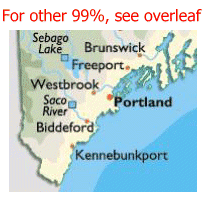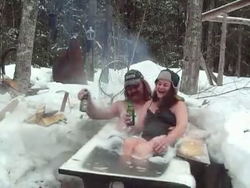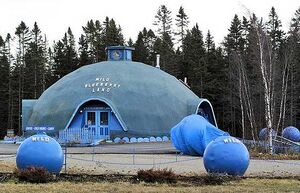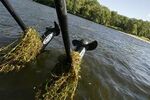Maine
| ||
| Nickname | The Pine Tree Nation | |
| Official language | Mainah. Ayuh. | |
| Capital | Cabot Cove | |
| National Hero | Jessica Fletcher, from Murder, She Wrote | |
| National Holiday | Whenever the Red Sox win. | |
| Religion | Paganistic Moose Worship, Personality cult of Jessica Fletcher | |
| State Motto | Dirigo (I'll tell you what to do, Gosh darn it.) | |
“Yesha! Dat dehr a goohd tractah.”
“I hahe dose damn othah lobstamen. Always causin' trouble!”
“You're gonna' see in the papers, Obama tells LePage to grow a pair.”
Maine is an idyllic wilderness region of toothless, inbred loggers and lobstermen, silently cultivating grudges until they erupt into blood-feuds, living without joy until encountering out-of-staters they can baffle with illogic. Maine performs important services to the nation; primarily, helping to repair the tarnished reputations of Kentucky and the Deep South by being more benighted than they are supposed to be.
History
Maine was once part of Massachusetts. However, Mainahs (as they are known (but only by themselves)), upon realizing in 1820 that they were far better than the "Massholes," promptly became a separate state. Massachusetts took this personally, and to this day its residents still plague Maine with terrible driving and obsessive leaf-peeping. Mainahs, for their part, loathe anyone and anything with a slight odor of Massachusetts—though they make a large exception if a Red Sox logo is attached.
For several years, the entire population of Maine was over the age of 65 and couldn't talk about anything except how important it was to keep the church alive. Then a bunch of lesbians moved to Portland, some Somalians moved to Lewiston, and things got out of hand. Now Maine comprises even older people, plus some young art students who aren't recognized for how talented they are, and scads of awful tourists with anchor insignias on their Booth-Bay sweatshirts with elastic around the waist and wrists.
Economy and Tourism
In contrast to the Western United States, in which vast stretches of land are owned by the government and underused, Maine is a place where vast stretches of land are owned by paper and timber companies and underused. (The Western lands look like barren moonscapes, whereas happily, land in Maine is converted to barren moonscape no more than once per generation.)
- Maine Turnpike
“To veer right, turn wheel clockwise.”
Under the U.S. Constitution, Maine is unable to erect customs booths at the border. Consequently, the customs booth is officially called a toll booth. Despite Maine's vast border, there is only one reasonable way into and out'n the state, and that is a perfect place for an outrageous toll, the alternatives being roads that Dungeons and Dragons describes as "a maze of twisty little passages."
Once past the toll, the road becomes flat, straight, and boring, not unlike the local women. The only diversion, apart from viewing p0rn on personal devices, is instructional markers (example above) placed on the median strip to help Mainers with their driving skills.
Mainers themselves benefit greatly from the Turnpike. A Mainer with a girlfriend upstate may make a trip every weekend to Bangor.
- Tourism
Tourism is the third largest component of Maine's economy, behind only legislating and inbreeding. Tourists are admitted to Maine only long enough to buy things in gift shops and get lost on the way to local beaches, after which Mainers close off the state, enjoying it for themselves until the next year. This inaccessibility, of course, only makes Maine an even more desirable tourist location. Mainers usually get their fill of tourists by about July 4.
Tourists contribute to the economy not only by patronizing businesses and paying outrageous admissions to "attractions," but by paying fines for reckless violations, such as as going 57 in a 55 zone, failing to turn headlights on during partly cloudy days, and driving a mere 400 feet behind school buses instead of the legally mandated two miles. These rules are only enforced against out-of-staters. If a Mainer uses the break-down lane to pass you on the right at 87 miles per hour, the trooper stops you.
Southern towns take note of out-of-state vehicles parked overnight, and on the 15th day, cite the vehicle for not being registered in Maine. This leads to additional lucrative business, as some tourists evidently believe they would have less trouble with cops if they drove around with two sets of license plates.
Culture
The Southern towns have also become a theater destination. This is not because anyone in his right mind would go to York expecting good theater; rather, thousands of urban swells vacationing on Pater's trust fund find themselves in York already, and seek out a theater to reassure themselves that they are a cut above the locals (though anyone wearing a wristwatch should not worry). As this is essentially fantasy, there are never any first-run productions, but mostly re-hashes of Broadway hits of the 1970's. Yul Brynner look-alikes are always in great demand. Fortunately, the region has a great many of them, if you can ignore the missing teeth.
- Language
Maine is well-known for its disdain for anyone not from Maine (that is, "from away"). These are commonly called "flatlanders," even though most of the populated sections of Maine are flat and most of the surrounding states and provinces are not. Mainahs delight in giving them driving directions, which always boil down to, "Ya cahn't git they'ah from he'ah." Many Maine towns and landmarks are given difficult names for this exact purpose. Others, such as Mexico, Norway, and Peru, are little tricks to scare the tourist into thinking he has overshot everything. The town named Bath is a comparable prank.
Mainahs also curiously tend not to pronounce the letter "r" in final position (examples: "they'ah; he'ah") except when it is absent, in which case they do (example: "sofer").
The Maine dialect is wonderfully agnostic about grammatical parts of speech. The word "wicked," though usually adverbial (and "wickedly" is never used), can be used as an exclamation, noun, and in a pinch, a proper name. Likewise, "fuckin'."
Grammarians regard "Ayuh" as the local variation of the word "Yes." Thing-of-it-is, "ayuh" can precede either positive or negative responses. For example:
- Tourist: Have you lived here all your life?
- Mainah: Ayuh. Not yet.
- Religion
All the major religions have congregations in Maine. Membership in an organized religion confers a distinctive identity (as bloodline certainly doesn't). Nevertheless, the average Mainer is defiantly agnostic about the existence of God and most other pressing questions, such as how to get to the next town ovah. "Well, Mishtah, seems ta me we don't know all the facts, now, do we?" This is because he is proudly unwilling to be bound to facts, or because he is drunk or otherwise doesn't understand the question.
Politics
“Support the Jobs Bond!”
Politics in Maine is explained by the fact that the state was once a dangling, wet appendage of nearby Massachusetts. Mainers assert their independence from the Mother Colony with pride, and in vain: A cursory tour of lawn signs any October shows that residents believe that casinos possibly owned by out-of-staters will wreck commerce, but simply borrowing from one another will save it. Residents leave the signs deployed out-of-season more faithfully than New Hampshirites do with Christmas tree lights.
The Massachusetts bug has resulted in Maine electing two U.S. Senators who, while Republican, line up with Democrats more faithfully than that woman who was in the middle of the famous Waitress Sandwich.
Governor Paul LePage is also, inexplicably, a Republican. He briefly set aside his promise to create jobs in order to tear down the mural from a wall of a state office building, which showed unionized stevedores shoveling against the tide on their way to clearing the tidal plain that would become Old Orchard Beach. It was not the first time that a victorious Maine politician took time out to smell the roses, and to flip the losers an enormous bird.
- Another toll road
Maine's economic plan for the 'Twenties involves the Great Proposed East-West Highway. Once dozens of town politicians have finished fighting over the exact route, this project will link northern Maine to The Cooze of New Hampshire and thence to the world tradeports of St. Johnsbury, Vermont and Plattsburgh, New York. It will finally bring prosperity to northern Maine despite its total lack of commerce and its total lack of inhabitants.
The highway has been proposed several times before. The key now, under the Republican Governor, is that it is to be a toll road, a unique fossil-fuel Solyndra, whose tolls will enchant visitors with northern Maine just as they already do in the south.
- Recent trends
For generations, Maine license plates served as advertisements for FAMOUS POTATOES. During the brief heyday of red-meat conservatism, the license plate was co-opted to advertise restaurants, with a lobster background—in beet-red, as lobsters never are, except when you are boiling them alive. Politics, they say, is a pendulum, and the backlash created whiplash. The state could not very well put FAMOUS MOONBATS on the plates (nor even FAMOUS VEGETARIANS); in fact, it settled on an uncontroversial pine cone (which is like your state touting its dandelion crop), but Maine had returned to its roots as a disconnected piece of liberal Massachusetts. Those interested can shuttle between the two parts with a trivial payment of $2.00 per trip to the New Hampshire Turnpike Authority.
After the 2000 election, Mainahs became disgruntled with the USA, and stated that "if that dumb hick gets elected again, I'm movin' to Canada!" However, after seeing the results of the 2004 elections, most realized that moving to Canada would be too much like actual work. They were elated after the 2008 election. Two years or so afterward, moving to Canada no longer seemed like work.
Geography
Tourists are drawn to Maine's forests and wildlife, them being two things about which Americans are clueless. Maine even has a desert, aptly named the Desert of Maine, which is located right next to the much larger Desert of Maine Gift Shop.
Moose, deer, and Canadians are common sights, as well they should be, as they outnumber the human population. They carry the risk of rabies. Moose are considered garden pests, and most hardware stores in the state sell Moose Repellent. By comparison, it's damned hard to find a good bottle of Canadian Repellent.
The state bird is the mosquito, present in swarms that often reduce visibility to zero. Maine mosquitoes are enormous (about twice as big as a turkey). Backstop screens at softball diamonds thus do double-duty. The black fly is somewhat smaller but has carried off pets and small children. It is raised as livestock on farms in Aroostook County.
Climate
Maine enjoys a well-balanced climate, ranging from temperatures of about 60 degrees below zero during the winter to 60 degrees above zero during the summer. Temperatures in the 70s are cause for statewide panic, while those exceeding 80 kill off the weaker Mainahs.
In the winter, snow and ice can pose extreme danger to anyone unfamiliar with Maine winters. Snowfall totals 30 feet most winters. People left outside during a Nor'eastah commonly freeze to death despite their thick Maine skins. Snow usually remains until late May, and the first snowfall of the year is commonly in late September.
Potatoes
Maine takes pride in its potato production, despite the fact that the potatoes are inedible and vastly inferior to Idaho potatoes. Unable to convince local supermarkets to sell them, King Angus came up with the idea of sending them to Zimbabwe. Inconveniently, Zimbabweans wouldn't touch them either. At present, all potatoes grown in Maine are simply harvested and thrown away.
During August, 1995 (one of the rare months in state history when it wasn't numbingly cold), Mainahs became fed up with this and tried to cross-breed potatoes with blueberries, the one crop that actually grows moderately well in the state. This resulted in an astoundingly disgusting mixture.
Now they take their Maine potatoes and make vodka and all the drunks and couch potatoes are very happy. Fat and happy. And drunk. Fat, happy, and drunk.
Milfoil
Milfoil has arrived in Maine waters. This infestation was preceded by decades by the infestation of government milfoil warning signs. These, and an army of armed but courteous game officers, help tourists remove milfoil from hiding places on boats and trailers, leaving the important function of moving milfoil among Maine's lakes to the ducks and geese.
When President Obama talks about algae as a replacement for crude oil, he may be referring to this future cash crop. Natural Resources bureaucrats will instruct you how to rake it out from in front of your summer home every two weeks, rather than just use weed-killer, because we just can't. They hope to refine it into ethanol so it can ruin engines and not just ponds, though they know Mainers would never actually allow a refinery, or even the increased trucking to take the milfoil to one.
Alternatively, you can just leave it there. The many Mainers who bathe in the lake find that it tickles, and it simplifies the task of getting your back clean.
Other eugenics experiments
“If two Mainers get divorced, are they still brother-and-sister?”
Maine has one of the shallowest gene pools in the nation. In many towns in the state, three or fewer families have managed to crank out 2000 or more inhabitants. The leaders of families are determined to keep their blood line pure to ensure that their strong family traits of bad teeth, stringy hair, and disproportioned women last forever.
However, there is evidence of inter-family breeding. For example, in the town of Chelsea, members of the Strout wing of the Thompson family, the Thompson wing of the Thompson family, and other members of the Thompson family refer to one another as "cousins" rather than siblings. Utah geneologists believe that all these wings are in fact a single family, which branched into different sub-families during the brief Chelsea Civil War (1989).
Day trips
You can see lots of high-powered computers when you drive into The City. (By "The City," Mainahs always mean Portland, as Mainahs are unaware that there are any other cities.) Unfortunately, your parents don't stop there, to save time in getting to your old, crazy uncle who lives up Houlton way and has a computer so old that you have to go down cellah and pedal the generatah for an ow'ah just to turn it on.

In contrast, tourists will drive past The City and into The Suburb (to-wit: Freeport) to stop at L.L. Bean, an outdoorsman's store that famously is open 24/7/365. (Mainahs never stop there, as such a combination of numbers makes their eyes glaze over.) L.L. Bean for decades sold wares that would be of great use during your week in the wilderness at the other end of the Weyerhauser toll road. The store now has dozens of branches and mostly sells outdoorsy apparel that cannot be machine-washed, and other gear for the young professional who still thinks that the store brand is more chic than The North Face. More baseball caps worn in Maine are from L.L. Bean (John Deere being a close second) than from all actual baseball teams combined.
A new generation that doesn't know from Freeport can follow the sign for Factory Outlets and exit at Kittery. The outlet district is the ingenious idea that shoppers would buy more Hanes sweatshirts at a store like Walmart if the sign on the store said Hanes. The brand names are first-quality and each garment is marked down 95% from the original price tag, but the effect is the same as at L.L. Bean: You spend your week in Maine gloating over all the bargains you found on the way in, until you realize that none of them keep your hands and feet from going numb.
| ||||||||||||||||||||
| Featured version: 22 June 2012 | |
| This article has been featured on the main page. — You can vote for or nominate your favourite articles at Uncyclopedia:VFH. | |






